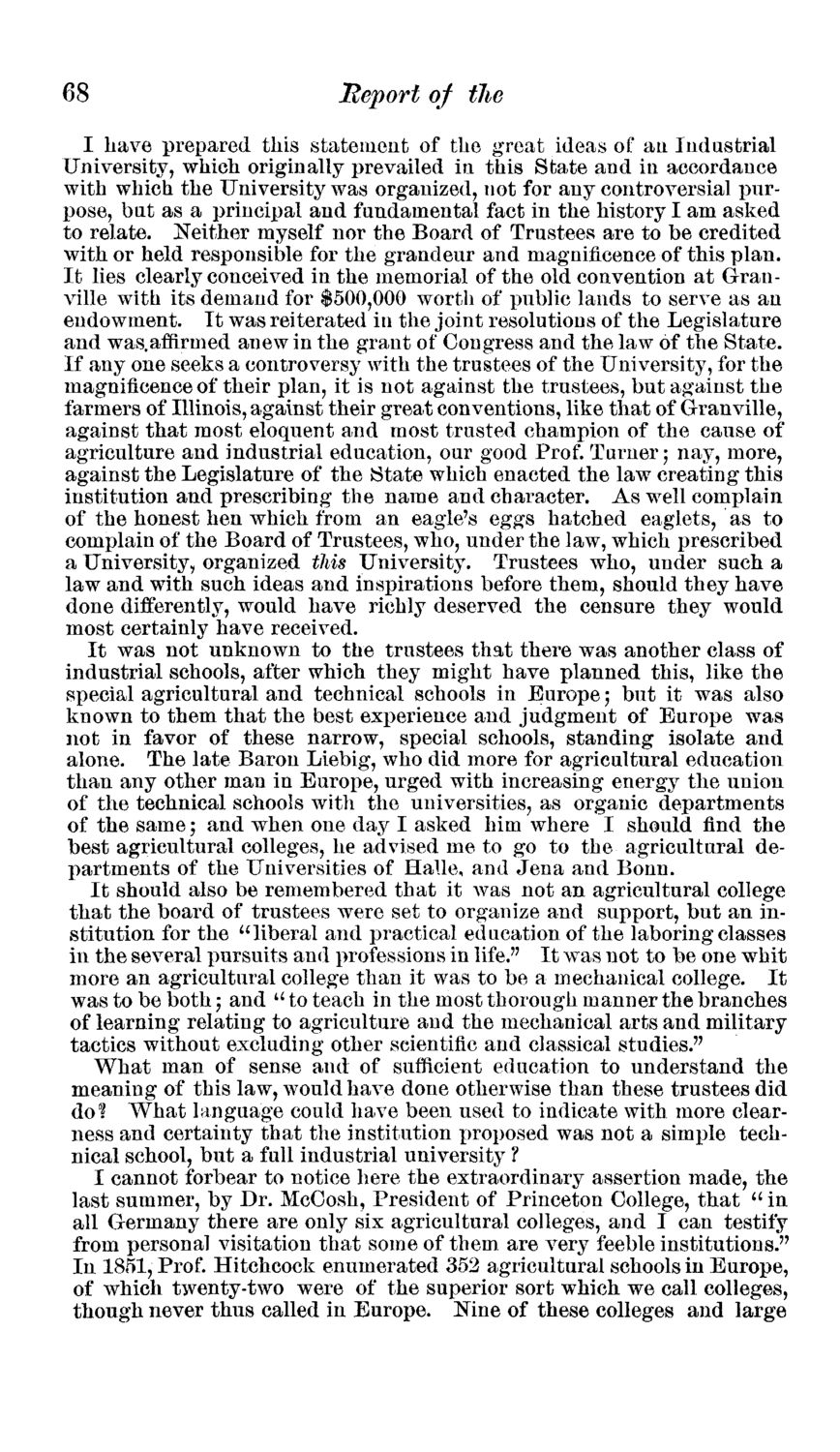| |
| |
Caption: Board of Trustees Minutes - 1874
This is a reduced-resolution page image for fast online browsing.

EXTRACTED TEXT FROM PAGE:
68 Report of the I have prepared this statement of the great ideas of an Industrial University, which originally prevailed in this State and in accordance with which the University was organized, not for any controversial purpose, but as a principal and fundamental fact in the history I am asked to relate. Neither myself nor the Board of Trustees are to be credited with or held responsible for the grandeur and magnificence of this plan. It lies clearly conceived in the memorial of the old convention at Granville with its demand for $500,000 worth of public lands to serve as an endowment. It was reiterated in the joint resolutions of the Legislature and was.affirmed anew in the grant of Congress and the law of the State. If any one seeks a controversy with the trustees of the University, for the magnificence of their plan, it is not against the trustees, but against the farmers of Illinois, against their great conventions, like that of Granville, against that most eloquent and most trusted champion of the cause of agriculture and industrial education, our good Prof. Turner; nay, more, against the Legislature of the State which enacted the law creating this institution and prescribing the name and character. As well complain of the honest hen which from an eagle's eggs hatched eaglets, as to complain of the Board of Trustees, who, under the law, which prescribed a University, organized this University. Trustees who, under such a law and with such ideas and inspirations before them, should they have done differently, would have richly deserved the censure they would most certainly have received. It was not unknown to the trustees that there was another class of industrial schools, after which they might have planned this, like the special agricultural and technical schools in Europe; but it was also known to them that the best experience and judgment of Europe was not in favor of these narrow, special schools, standing isolate and alone. The late Baron Liebig, who did more for agricultural education than any other man in Europe, urged with increasing energy the union of the technical schools with the universities, as organic departments of the same; and when one day I asked him where I should find the best agricultural colleges, he advised me to go to the agricultural departments of the Universities of Halle, and Jena and Bonn. It should also be remembered that it was not an agricultural college that the board of trustees were set to organize and support, but an institution for the "liberal and practical education of the laboring classes in the several pursuits and professions in life." It was not to be one whit more an agricultural college than it was to be a mechanical college. I t was to be both ; and " to teach in the most thorough manner the branches of learning relating to agriculture and the mechanical arts and military tactics without excluding other scientific and classical studies." What man of sense and of sufficient education to understand the meaning of this law, would have done otherwise than these trustees did do? What language could have been used to indicate with more clearness and certainty that the institution proposed was not a simple technical school, but a full industrial university ? I cannot forbear to notice here the extraordinary assertion made, the last summer, by Dr. McCosh, President of Princeton College, that " in all Germany there are only six agricultural colleges, and I can testify from personal visitation that some of them are very feeble institutions." In 1851, Prof. Hitchcock enumerated 352 agricultural schools in Europe, of which twenty-two were of the superior sort which we call colleges, though never thus called in Europe. Mne of these colleges and large
| |